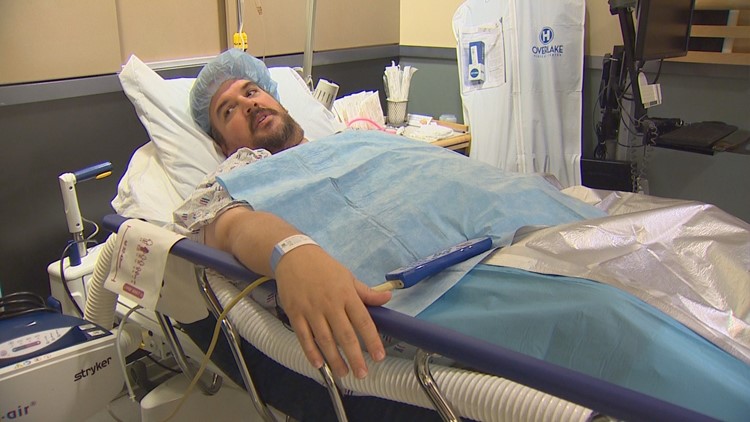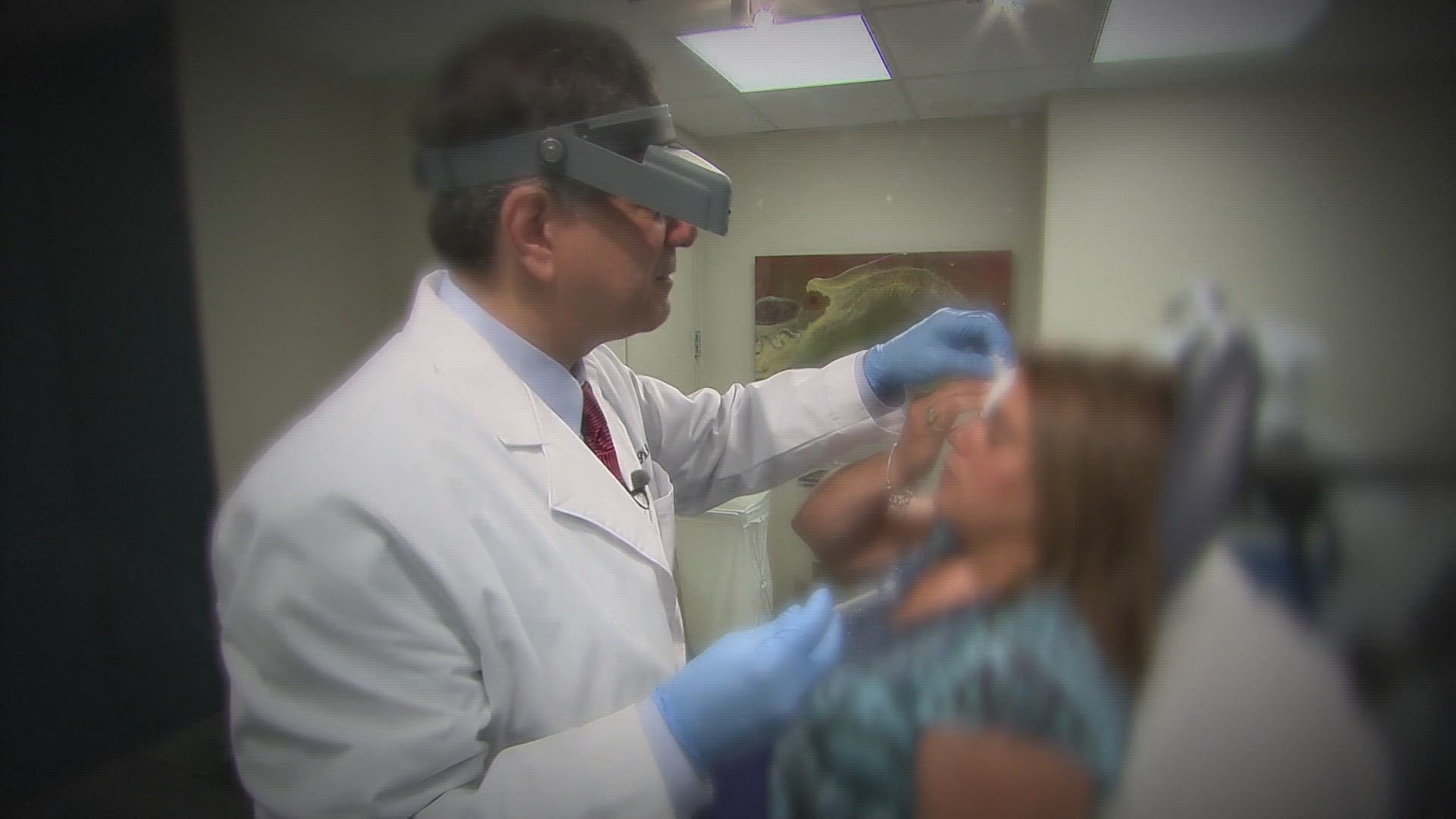Editor's Note: Chris Zito is a KING 5 TV producer. Follow his journey through Gastric Bypass surgery on KING 5 Mornings. The following is a reflection Chris wrote on what led up to his decision to have the procedure.
For almost as long as I can remember I have been overweight. It probably started around 3rd or 4th grade. I know by 5th grade I was heavier than most kids in the class, but I was fairly athletic, fairly active, and always had friends and the weight was not really an issue. Through middle school and high school, I continued to put on weight. I knew my weight was getting away from me, but it still wasn't preventing me from doing anything. It wasn't holding me back socially, I was never teased or bullied. I couldn't say exactly how much, but by the time I left for college I was probably over 250 lbs. and definitely a 2XL for all my clothing. In college, I continued to put on weight. I know that by my second year in school, I was too big to ride certain rollercoaster. It was around this time that air travel also started to become an issue.
I've known for most of my life that my weight was directly linked to my eating. When I was little I would put extra milk in the cereal bowl so that when the Cheerios were gone I'd have a reason to pour more in the bowl and not waste the milk. When I was older, I would eat an entire package of pasta without a second thought.
If I were to make myself a sandwich, it would begin with an entire loaf of French bread and by the time it was done it would be big enough for four people.
As I set off on my own after college, my eating only got worse. At least in social situation I was able to control what I would eat. I would order normal dishes at restaurants, but I would always clean my plate. It's when I was dining alone or cooking for myself where I lost control. There was always a snack that accompanied any meal preparation. If the chicken needed 30 minutes to cook, I might have a sandwich while I waited. A trip to a buffet wasn't complete until at least three plates were cleaned, but more likely four or five.
Things always began innocently enough, when cooking I would plan for leftovers, but rarely would any of the food last that long. At some point, fast food became a serious problem. Value meals weren't enough. There was always an 'and'. "I'll take a large number 7 AND two tacos." The 'ands" really started to add up. A trip to the sandwich shop usually ended with me walking out with two footlongs. I had a huge appetite and it was paired with frequent bouts of boredom. It was like I was chain smoking my meals. As soon as I would finish one meal I would start thinking about the next. It was rarely, if ever, about being hungry.
It was somewhere in my late 20s or early 30s that I started to think about how my weight could affect my lifespan. Both my parents had adult-onset diabetes, and I figured I was a prime candidate for that. The 2XL clothes gave way to 3XL. I had to start buying everything from specialty stores. My doctors recommended diets, exercise plans and medications to curb the eating and reverse the trend. And for a decade I dabbled in all of them. I tried Nutrisysem twice. I joined and quit a half dozen gyms. I downloaded apps to track my exercise and my eating. Nothing stuck. Nothing lasted. I would lose 20 or 30 lbs. and get complacent and the next thing I knew I had gained it all back with interest.
I kept looking for external motivation. I kept telling myself that I just needed to bear down and focus and I could do it. I met my wife and thought it would be the motivation I needed to finally lose weight. We set a wedding date and I set a goal to lose weight. It didn't happen. She got pregnant and I set another goal to lose weight by the time our child was born. It didn't happen. In fact, by the time my daughter was born, some of my 3XL clothes were starting to get a little snug.
Five minutes after my daughter started walking, I could no longer keep up with her and forget about getting down on my knees to play with her. It was painful and a struggle.
Then two years ago I went to a doctor because I needed to get a screening for colon cancer. My father had just been diagnosed with it and I needed to get checked. During that appointment, my doctor asked me if I had considered weight loss surgery. He wasn't the first to ask me that question. He was probably the fourth. That question, and the fact that I had tipped the scale at 414 lbs. that day (my highest recorded weight), and the knowledge that my weight was a risk factor in the diagnosis and treatment of cancers, I guess it finally clicked. It was then I realized that if I was going to lose the weight, I needed help. Willpower and determination weren't going to do it.
My doctor gave me a referral, and I attended a weight loss seminar.
It was eye opening to say the least. I knew that I was teetering on the edge of some potentially catastrophic health issues, but I didn't realize just how many things I was at risk of developing. I decided that night that I was going forward with surgery whether It was covered by insurance or not. Whether my wife agreed with it or not. (She did, by the way.)
I filled out the information form indicating that I wanted to move forward with the process. But the next day I got a phone call from the hospital informing me that while my health insurance did cover that type of surgery, their program didn't have the proper accreditation.
I called the insurance company to inquire about my options. That’s how I wound up at Dr. Nguyen's office. The Bariatric Center at Overlake had the needed certification and the staff there were more than happy to talk to me.
At my initial visit the nurse walked me, step-by-step, through the process. It was far more comprehensive than I had anticipated, but the details and the processes were reassuring to me. There were meetings with a nutritionist, there was a psychological evaluation, there was the initial meeting with the surgeon, group support meetings, and an online community of people at all stages of weight loss.
I had no preconceptions about the type of surgery I would have. Dr. Nguyen recommended RNY Gastric Bypass based on the amount of weight I needed to lose. He walked me through each procedure and the possible side effects and after his explanations I was in agreement that the RNY procedure would be the best for me. He made it clear that this surgery did carry risk. That risk was small, but there could be complications or even death. This procedure would change the way I digest and process food. I would need to take vitamin supplements for the rest of my life.
I didn't really feel any reservations about having the surgery. I knew that it would significantly alter my life in many ways, but what was more pressing in my mind was how much life would I have left if I didn't do it.
I've never been suicidal, but I have contemplated my own mortality. The overriding thought that I have had is my desire to see my daughter grow up. I want as much time with her as I can get and if it means I have to change the way I eat, or what I eat, or anything for that matter, I am going to do it.
I also came away from talking to Dr. Nguyen with a better understanding of what these types of surgeries could do for people like me. I was blown away by sheer number of ailments that could be prevented or delayed or mitigated by having the surgery. And I was moved by Dr. Nguyen's passion for helping change people's lives. Being a morning news producer, I am always looking for stories or people to feature on my show, and Dr. Nguyen seemed like the perfect person to showcase this issue. I mentioned that I would love to have him come on my show and talk about his work. That conversation somehow morphed in to me suggesting that we just film the whole thing for the news. To my surprise, he agreed to it.
There were really only two hurdles I had to navigate ahead of the surgery. The first was passing the psych evaluation. That was fairly straight-forward -- I knew what I was getting into. I knew the risks. I was doing this of my own free will.
The second hurdle was a little tougher. I had to lose 10 percent of my body weight as required by the insurance company. In my case that meant 40 lbs. Luckily, as part of the program at Overlake, I had the help of a nutritionist who gave me a game plan that was easy to follow. The other thing that helped me was having an attainable goal. The thought of trying to lose 200+ lbs. is daunting. It almost seems impossible. Forty, by comparison, is easy. And in fact, it was fairly easy. Starting in March, I cut my calorie intake from 3,000 or 4,000 a day to 1,500. This change alone made a huge difference. I dropped 20 lbs. in a month. I kept the calories down by eating salads. Lots of salads. And I used salsa instead of dressing. I was still eating large portions, but the calories weren't there anymore. The rapid weight loss was great, but all the time in the back of my mind I was still thinking about food. I realized one of the reasons I was so focused on having the surgery was that little voice in the back of my mind telling me how good it would be to grab a pizza … or hit up a buffet. I knew that I needed the surgery to act as a barrier to prevent me from falling back in to my old ways. I was going through this door, slamming it behind me.
In May, I met again with Dr. Nguyen. Based on my weight loss, he set the surgery date for August.
By this time I was exercising more and eating less. The weight continued to fall off. In July when I met with the doctor for the final time before surgery, he asked if I still wanted to go through with it. I said of course, knowing that for me there really wasn't an option.
To this point, I was aware of the potential dangers, but they all seemed insignificant. The reward of a healthier life was more than worth the risk. It wasn't until the night before surgery that I began to have second thoughts.
The night before surgery I started to question why I was doing this. I knew I would go through with it, but I kept contemplating the worst-case scenario in my head. The one irrational thought spinning through my head was I would feel pretty stupid if I died on the operating table.
I'm writing this today, so spoiler alert, I didn't die.



